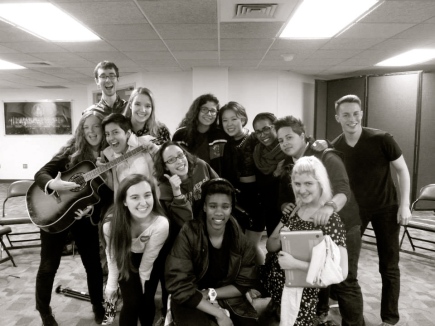The Student Becomes the Teacher: Creating Peer-to-Peer Inclusive Sex Ed
In my friend group of people of color, queer, trans, disabled, First-Generation people, we talk about marginalization and oppression. A lot. It’s not only part of the work we take on as activists but it’s also the reality of living as multiply marginalized young people. One of the experiences almost all of us have in common is being desexualized on the basis of these identities that we proudly hold. Because of all the questions our own friends had, my friend Lex and I decided to create an affirming sex ed program created by people who had been left out of conversations about sex ed altogether.
Not Your Average Sex Talk (NYAST) is a peer-to-peer sexual education program taught by college students for college students that uses a social justice framework to discuss issues related to sex and intimacy that are often neglected in traditional sex education settings. These issues critical to navigating safe and consensual sex include: testing, health information, power dynamics, consent, and sexual values. The NYAST model engages participants in a judgment-free zone and teaches college students how to bring tailored, peer-to-peer programming to their campus. Understanding that there is no universal, comprehensive sex ed curriculum, our program aims to: disperse sexual health information; facilitate discussions beyond heteronormative sexual intercourse; and address how homo/bi/transphobia, ableism, and racism intertwine with attraction and intimacy. Our biggest goal is to create dialogue and resources that are sex-positive, intersectional, and catered towards marginalized people. For sex ed to be truly inclusive, the movement for inclusivity and acceptance in the field cannot do so without incorporating the frameworks of multiple social movements. The 2014 National Sex Ed Conference released a statement that show the importance of creating intersectional sex education:
Solidarity Statement on Racial Justice in Sexuality Education Because we are in the field is Sexuality Education, a profession skilled at creating space for dialogue, acknowledging difficult topics, and facilitating change; Because we stand on the shoulders of many before us, some who have received recognition and others who have not; Because we live in a country founded on systems of oppression, institutionalized racism, and violence; Because we see police brutality, racial profiling, and mass incarceration as a gross misuse of power which terrorizes individuals, families, and communities; Because we know the system is not broken, it is doing exactly as it intended; Because of all this, and so much more, we also know – Because we are a part of the problem, we are also part of the solution; Because we as sexuality educators teach about love, equity, justice, relationships, communication, and safety; Because we believe in living our lives fully, with intention, agency, and freedom from fear; Because we hold power, as individuals and as organizations; Because we can, and we must; As a multicultural group, we commit to addressing and working to undo racism on personal, professional, and institutional levels within the field of sexuality education and in our diverse roles within it, in solidarity with other movements towards racial justice; Today, we commit to the formation of plans of action towards racial justice in sexuality education. (WoC Sexual Health Network)
Statements of solidarity like these can truly drive a more inclusive sex-ed movement. Making sex-ed not only inclusive and empowering for people of color but also making it LGBTQ inclusive and disability inclusive could improve the health and wellbeing of our communities. So, where does desexy come into all of this? A blog post on gudbuy t’jane summarizes why talking about desexualization is critical in social justice movements:
We want to believe our desires are our own, unshaped by the media, patriarchy, racism, ableism, transmisogyny, or other oppressive systems. This is even more challenging when one’s identity is based in ideas of activism, social justice and equality; We don’t want to feel like we’re upholding oppressive standards, or engaging in systems which sometimes violently desexualize marginalized identities. (Dating from the Margins: Desexualizing and Cultural Abuse)
Creating inclusive and sex-positive sex ed means creating a space for people to talk about these experiences of desexualization, how we process them, and how we learn to reclaim our own unique “desexiness.” Even those who are committed to social justice can perpetuate desexualization. We need to dismantle the systems that normalize desexualizing oppressions. We can only begin to do so if we sit down and intentionally lean into our discomfort to have these difficult conversations. In the conclusion of desexy, we will talk about how to reclaim these experiences and what we can learn from them. Up next, the final installment of Relearning Sexy tackles how far I’ve come but how far I have yet to go. References “Dating from the Margins: Desexualizing and Cultural Abuse.” Gudbuy T’Jane. WordPress, 13 Oct. 2011. Web. 2 Jan. 2015. WoC Sexual Health Network. “WOCSHN at National Sex Ed Conference 2014.” YouTube. Youtube, LLC, 7 Dec. 2014. Web. 13 Jan. 2015.
